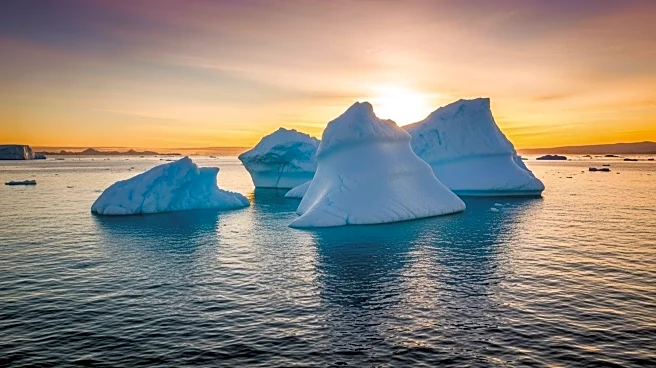What's Happening?
Recent observations in Antarctica have revealed alarming climate shifts, with atmospheric temperatures soaring to unprecedented levels. This increase is linked to a significant decrease in the speed of stratospheric currents and a reduction in the rate of ozone layer thinning. The Antarctic region, typically known for its harsh, cold conditions, is experiencing anomalies that highlight the broader impacts of climate change. According to Martin Jucker from the University of New South Wales, temperatures that are usually around -67°F have recently reached -4°F. This dramatic rise is associated with the collapse of the polar vortex's speed, with cold air masses now moving at less than 62 miles per hour. Such phenomena, expected to occur once every two decades, have been recorded four times since the beginning of the 21st century. These changes are causing unprecedented heatwaves and summer sea ice losses, leading to catastrophic breeding failures among penguin colonies.
Why It's Important?
The changes in Antarctica have far-reaching implications for global climate systems. The alteration in sea currents can disrupt nutrient flows, impacting fish populations and the broader food chain. The loss of sea ice not only endangers local wildlife but also contributes to global sea level rise. As ice melts, it adds fresh water to the ocean, affecting salinity and further destabilizing climate patterns. These shifts are a stark reminder of the interconnectedness of Earth's climate systems. Scientists are particularly concerned about the potential for increased frequency and intensity of natural disasters, such as storms and floods, as a result of these changes. The data collected from Antarctica is crucial for climate models predicting future trends, helping policymakers and communities worldwide to mitigate the effects of climate change.
What's Next?
The international community must collaborate to address the challenges posed by Antarctic climate changes. Efforts to reduce greenhouse gas emissions and promote sustainable practices are essential. Initiatives aimed at preserving marine life and protecting vulnerable ecosystems must be prioritized. The global response will require coordination across multiple sectors, including government, industry, and civil society, to create impactful solutions. The future of Antarctica's climate remains uncertain, but the urgency for action is clear. As the planet continues to warm, the consequences of inaction could be dire, emphasizing the need for nations to come together to combat climate change and protect fragile environments.
Beyond the Headlines
The Antarctic climate changes highlight the ethical responsibility of the global community to address environmental issues. The scientific findings from Antarctica provide invaluable insights into climate dynamics, which are crucial for developing effective strategies to combat climate change. The challenge lies in translating these findings into actionable policies that address the root causes of climatic shifts. The international community's response will determine the future of not only Antarctica but also the global climate.








